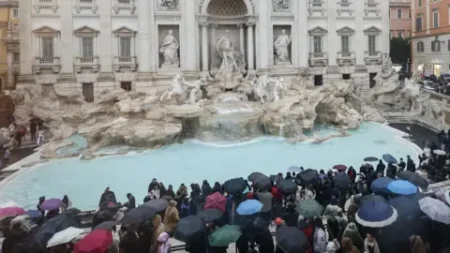In a surprising and somewhat controversial announcement, CBS revealed that it would be canceling “The Late Show with Stephen Colbert,” with the final episode slated for May 2026. This decision has raised eyebrows across the entertainment industry, particularly given that Colbert’s show has consistently been one of the highest-rated programs in the late-night television segment. The move comes amidst a turbulent backdrop for the network, prompting speculation regarding its implications for CBS’s future in the realm of late-night programming.
The announcement was made official on a Thursday evening, leading to widespread shock among fans and industry insiders alike. CBS specified that the decision to end the show was fundamentally a financial one, influenced by the current challenging landscape of late-night television. In their statement, the network emphasized that this decision was not attributable to the show’s performance or the controversies surrounding its parent company, Paramount. Nonetheless, the timing of the cancellation has sparked questions, particularly since it occurred just weeks after Paramount settled a lawsuit with former President Donald Trump, centered on CBS News’ portrayal of him.
Stephen Colbert, renowned for his assertive criticism of Trump and his politically charged humor, hinted at the uncertainty surrounding his show’s future when he returned from a vacation. During a live taping, he openly condemned the aforementioned settlement, describing it as a “big fat bribe” and jokingly mentioned the protective qualities of his new mustache against corporate pressures. This light-hearted comment, however, underscored the serious nature of the situation at hand, igniting discussions about the looming changes in late-night television dynamics.
As the news broke, Colbert was quick to address the audience during his Thursday evening show. The atmosphere in the studio was palpable with audible ‘boos’ from his loyal audience as he confirmed, “Next year will be our last season.” The somber revelation made it clear that CBS was officially pulling the plug on “The Late Show,” marking a significant transition in the late-night landscape. Colbert expressed his gratitude to CBS for the opportunity and partnership throughout his tenure, acknowledging the network’s support with sincerity.
Colbert has held the hosting chair since 2015, following the departure of the legendary David Letterman. His announcement of the show’s end sparked reflections on the challenges of late-night talk shows, especially in light of CBS’s previous cancellation of “The Late Late Show with James Corden” in 2023, which was cancelled due to declining profitability. The changes within CBS raised concerns about the viability of late-night programs as they face increasing competition from streaming platforms and changing viewer habits.
Amidst these cancellations and shifts, Colbert has also played a role behind the scenes as an executive producer, helping create replacements for shows like Corden’s, which ultimately had a unsatisfactory run and was discontinued earlier this year. This ongoing evolution indicates the precarious state of late-night television, as networks are compelled to rethink their programming strategies in response to evolving viewer preferences and financial realities.
The sentiment of gratitude was palpable as Colbert closed his segment by thanking his audience — “you, the audience, who have joined us every night in here, out there, all around the world.” He expressed a wistfulness about the end of his tenure, wishing that someone else would carry on the legacy after him. “I wish somebody else was getting it after me,” he stated, hinting at his sense of ownership over the format as well as his concern for its future.
As this narrative continues to unfold, the implications of CBS’s decision widen. Not only does it suggest a retraction from late-night television for the network, but it raises broader questions about the future of such formats in an era increasingly dominated by digital media and streaming services. As the months progress, the entertainment industry will undoubtedly keep a close eye on how CBS navigates this shift, and what it may mean for the late-night landscape as a whole.











